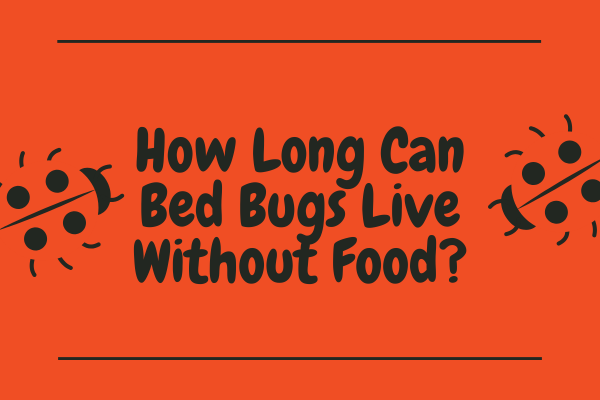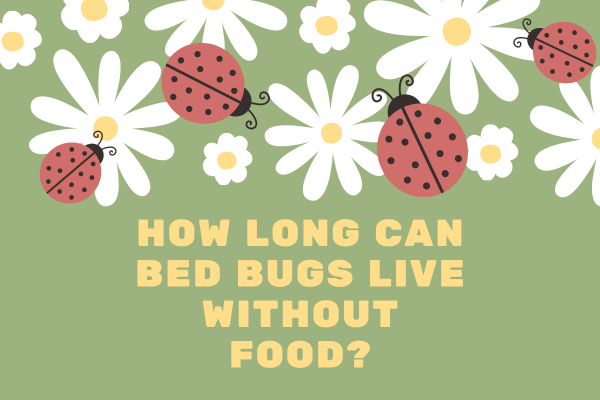Introduction: How Long Can Bed Bugs Live Without Food?
Bed bugs, those elusive nocturnal pests that infest our homes and disrupt our peaceful slumber, have become a growing concern for many. These tiny, blood-sucking insects have mastered the art of survival and adaptation, making them notoriously difficult to eradicate. One intriguing aspect of their resilience is their ability to endure extended periods without a meal. In this article, we delve into the world of bed bugs and uncover the answer to the burning question: How long can bed bugs live without food? So grab a cup of coffee, sit back, and prepare to be amazed by the secrets of bed bug survival.
How Long Can Bed Bugs Live Without Food?
To truly comprehend the tenacity of bed bugs, it is crucial to understand the length of time they can survive without a blood meal. So, without further ado, let’s unveil the astonishing truth about the endurance of bed bugs without sustenance.
- A Remarkable Lifespan
Bed bugs are incredibly resilient creatures, capable of surviving for surprisingly long periods without feeding. On average, an adult bed bug can go without a blood meal for up to six to twelve months. Yes, you read that right—up to an entire year! However, it’s important to note that this exceptional survival time frame is contingent upon various factors, such as temperature, humidity, and the bug’s age and health.
- Nymphs and Their Survival Abilities
Nymphs, the immature bed bugs that emerge from eggs, possess comparable endurance when it comes to surviving without sustenance. Although they require a blood meal to molt and progress through their life stages, nymphs can endure for several weeks to several months without feeding. Their ability to adapt to adverse conditions contributes to their longevity in the absence of a suitable host.
- The Resilience of Bed Bug Eggs
Bed bug eggs, which are minuscule and translucent, hold a remarkable level of resilience. These tiny capsules of life have the potential to remain dormant for extended periods until favorable conditions arise. Bed bug eggs can survive without hatching for up to two to five months, depending on the surrounding environment. Once the eggs hatch, the newly emerged nymphs will immediately seek a blood meal to nourish their growth.
FAQs About How Long Bed Bugs Live Without Food
Now that we’ve explored the astounding lifespan of bed bugs without food, let’s address some commonly asked questions regarding their survival abilities.
FAQ 1: How do bed bugs survive for so long without feeding?
Bed bugs possess a unique metabolic system that enables them to lower their energy requirements and enter a state of dormancy when deprived of food. This adaptive mechanism allows them to conserve energy and survive for extended periods without a blood meal.
FAQ 2: Can bed bugs survive in an empty house?
Absolutely! Bed bugs can survive in an empty house as long as the environment remains suitable. They can hide in cracks, crevices, furniture, electrical outlets, or even hitch a ride on clothing or luggage, eagerly waiting for their next opportunity to feed.
FAQ 3: What factors affect the survival time of bed bugs without food?
Several factors impact the length of time bed bugs can survive without feeding. Temperature, humidity, access to hosts, and the bug’s life stage all play significant roles. Warmer temperatures and higher humidity levels generally decrease their survival time, while cooler temperatures and lower humidity can extend their endurance.
FAQ 4: Can bed bugs become dormant if there is no food available?
Yes, bed bugs can enter a state of dormancy known as diapause when they are deprived of food. During diapause, their metabolic activity decreases, allowing them to survive for an extended period without feeding. This adaptive behavior helps them endure unfavorable conditions until a suitable host becomes available.
FAQ 5: How long can bed bugs live without feeding in cold temperatures?
Cold temperatures can significantly impact the survival time of bed bugs without food. In chilly environments, bed bugs’ metabolism slows down, prolonging their survival. Under optimal cold conditions, bed bugs can survive without feeding for approximately two to six months.
FAQ 6: What happens when bed bugs finally find a host after a long period without feeding?
When bed bugs locate a host after a prolonged period without feeding, they waste no time. They will quickly emerge from their hiding spots and engage in a blood-feeding frenzy. Bed bugs are equipped with specialized mouthparts that pierce the skin and extract blood from their unsuspecting hosts. Once engorged, they retreat to their hiding places to digest the blood meal and reproduce.
Effective Strategies to Combat Bed Bugs
Now that we understand the impressive endurance of bed bugs without food, let’s explore some effective strategies to combat these persistent pests.
- Professional Pest Control
If you find yourself facing a significant bed bug infestation, it’s advisable to seek professional pest control services. Experienced exterminators have access to advanced techniques and treatments that can effectively eliminate bed bugs from your home. They can tailor their approach to your specific situation, ensuring thorough eradication and preventing future infestations.
- Thorough Cleaning and Vacuuming
Regular and thorough cleaning of your living space is crucial in preventing and managing bed bug infestations. Vacuuming all surfaces, including mattresses, carpets, and furniture, can help remove adult bugs, nymphs, and eggs. Be sure to dispose of the vacuum bag or clean the canister immediately to prevent any potential reinfestation.
- Heat Treatment
Bed bugs are highly sensitive to high temperatures. Heat treatment involves raising the temperature of the infested area to levels that are lethal to bed bugs. Professional heat treatment services can effectively eliminate bed bugs, targeting their hiding spots and ensuring comprehensive eradication.
- Mattress and Furniture Encasements
Using mattress and furniture encasements can help contain and control bed bug infestations. These specialized covers create a barrier, preventing bed bugs from accessing or escaping their hiding places. Additionally, encasements make it easier to identify and eliminate any remaining bugs by trapping them inside.
- Regular Inspections and Early Detection
Vigilance is key in dealing with bed bugs. Regularly inspecting your living space, particularly beds, furniture, and cracks in walls, can help identify an infestation in its early stages. Early detection allows for prompt treatment, minimizing the spread and severity of the infestation.
- Proper Hygiene and Prevention
Maintaining proper hygiene and cleanliness in your living environment can help prevent bed bug infestations. Regularly wash bedding, clothing, and other infested items in hot water and dry them on high heat to eliminate any hidden bugs or eggs. Additionally, avoid bringing used furniture or bedding of unknown origin into your home, as they can serve as potential carriers of bed bugs.
Conclusion
In conclusion, bed bugs possess remarkable survival capabilities, enabling them to endure extended periods without a blood meal. Adult bed bugs can survive for up to a year, while nymphs and eggs also exhibit impressive resilience. Factors such as temperature, humidity, access to hosts, and life stage play significant roles in determining their survival time.
Understanding how long bed bugs can live without food is essential for devising effective strategies to combat infestations. Whether you choose professional pest control services, implement thorough cleaning and vacuuming practices, utilize heat treatments, or employ mattress and furniture encasements, a multi-faceted approach is often necessary for successful eradication.
Moreover, early detection through regular inspections, practicing proper hygiene, and preventing the introduction of infested items into your living environment are vital preventive measures. By staying vigilant and taking prompt action, you can mitigate the risk of bed bug infestations and protect your home and loved ones.
So, the next time you find yourself wondering how long bed bugs can survive without food, remember their astonishing endurance and adaptability. Don’t let these resilient pests take over your sanctuary. Take the necessary steps to combat bed bugs and reclaim your peaceful sleep.
Visit the link to read more:
https://family-fitness-fun.com/eat-move-make-food-fitness-travel-lifestyle/





